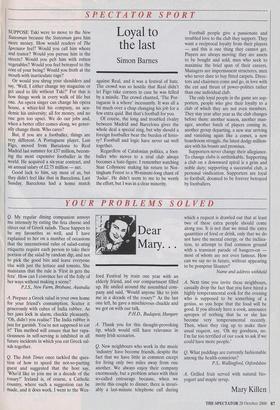SPECTATOR SPORT
Loyal to the last
Simon Barnes
SUPPOSE Taki were to move to the New Statesman because the Statesman gave him More money. How would readers of The Spectator feel? Would you call him whore and traitor? Would you pursue him in the streets? Would you pelt him with rotten vegetables? Would you feel betrayed to the core of your being? Would you froth at the mouth with inarticulate rage? • Or would you shrug your shoulders and say, 'Well, I either change my magazine or get used to life without Taki?' For that is how things work in every walk of life but one. An opera singer can change his opera house, a whizz-kid his company, an aca- demic his university; all for money, and no one gets too upset. We do our jobs and, when a better offer comes along, we gener- ally change them. Who cares?
But, if you are a footballer, things are very different. A Portuguese player, Luis Figo, moved from Barcelona to Real Madrid last summer for £37 million, becom- ing the most expensive footballer in the world. He acquired a six-year contract, and an annual salary of £2.75 million — net.
Good luck to him, say most of us, but they didn't feel like that in Barcelona. Last Sunday, Barcelona had a home match against Real, and it was a festival of hate. The crowd was so hostile that Real didn't let Figo take corners in case he was felled by a missile. The crowd chanted, 'The Por- tuguese is a whore' incessantly. It was all a bit much over a chap changing his job for a few extra quid. But that's football for you.
Of course, the long and troubled rivalry between Madrid and Barcelona gives the whole deal a special zing, but why should a foreign footballer bear the burden of histo- ry? Football and logic have never sat well together.
Regardless of Catalonian politics, a foot- baller who moves to a rival club always becomes a hate-figure. I remember watching Stan Collymore making his return to Not- tingham Forest to a 90-minute-long chant of `Judas'. He didn't seem to me to be worth the effort, but I was in a clear minority. Football people give a passionate and troubled love to the club they support. They want a reciprocal loyalty from their players — and this is one thing they cannot get. Players are always moving: they are assets to be bought and sold, men who seek to maximise the brief span of their careers. Managers are impermanent structures, men who never dare to buy fitted carpets. Direc- tors and chairmen come and go, in love with the cut and thrust of power-politics rather than one individual club.
The only loyal people in the game are sup- porters, people who give their loyalty to a club of which they are not even members. They stay year after year as the club changes before them: another season, another man- ager, another batch of players coming in, another group departing, a new star arriving and vanishing again like a comet, a new boardroom struggle, the latest dodgy million- aire with his boasts and promises.
Supporters never change their allegiance. To change clubs is unthinkable. Supporting a club on a downward spiral is a grim and noble duty; supporting a successful club, a personal vindication. Supporters are loyal to football, doomed to be forever betrayed by footballers.


























































































 Previous page
Previous page